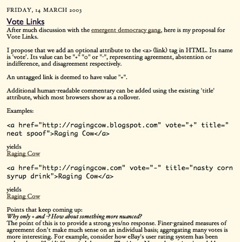Original URL: https://www.theregister.com/2010/04/28/web_politics_how_real/
Web politics: The honeymoon is over
Spam and astroturf are souring the dream
Posted in Legal, 28th April 2010 12:38 GMT
Parallel moves in Canada and the US may signal the end of the honeymoon for web-based political campaigning - or change it beyond recognition.
Politicians are becoming increasingly familiar with sudden squalls of email filling up their inboxes, and policy makers with responses to public consultations arriving via a web intermediary. But not surprisingly many of these can be phoney, inflating the true size of what purports to be "grassroots" campaign.
The shortcomings of the web-based approach were illustrated here recently. Photographers on a shoestring budget successfully mobilised against Clause 43 - but internet campaigners concerned about file-sharing who used a site to send 20,000 emails about the Digital Economy Act failed to make an impression, resulting in a triumph for the BPI.
Earlier this month Obama's internet guru, Harvard academic Cass Sunstein, warned departments that internet opinion shouldn't be used as an opinion poll or focus group. He advised that:
Agencies exercise good judgment and caution when using rankings, ratings, or tagging. Specifically, agency use of the information generated by these tools should be limited to organizing, ranking, and sorting comments. Because, in general, the results of online rankings, ratings, and tagging (e.g., number of votes or top rank) are not statistically generalizable, they should not be used as the basis for policy or planning.
That's pretty conclusive. Four years ago, Sunstein published a love letter to Web 2.0 called Infotopia: How Many Minds Produce Knowledge that praised Wikipedia, blogs and prediction markets. But this is an altogether more sober assessment. He seems to have had second thoughts.
A vivid illustration of how a few single-issue fanatics can skew the results of an opinion poll is currently being digested in Canada. Lawyer Richard Owens has investigated the responses and found something quite interesting.
In response to a copyright form paper, over 8,000 responses were submitted, but 65 per cent of these were an identical form email from one IP address, the "Canadian Coalition for Electronic Rights". Owens notes that these:
...Included Submissions in which: no names were used; only first names were used (there were, for example, sixty-eight “Chris” and seventy-two “John” who made Submissions); and, suspect names, such as - “D Man”, “El Qwazo”, “pr0f1t”, “Cereal”, and “Eagle” - were used. Given the ability to submit anonymously or under false identification, is highly probable that there are multiple Submissions from the same persons.
The CCER form letter had been circulated around Bittorrent P2P fan sites. But most of the visitors to these sites aren't Canadian. Quantity overruled quality.
“Asking for people's identity is a pretty massive process”
Observers wondered whether something similar might have happened in the UK. When the Open Rights Group ventured into the real world, the numbers were small: it mustered just over 100 bodies for its main demo, and only single figures for its "flash mobs". The ORG's "Your Message To Mandelson" campaign launched last year rapidly gathered 300 anonymous messages - but stalled at around the 500 mark.
Such disparities led people to question how representative the online activity really was. "Is this a particularly well-focussed campaign by a relatively small group of activists?", asked the BBC's Rory Cellan Jones.
Our interest in the ORG write-in was piqued when one reader told us he'd successfully sent a Digital Economy email from a US IP address - he'd just made up a postcode.
Fear the swarm?
The Digital Economy emails were organised by a relatively new campaigning website, 38 Degrees, which helped send the Digital Economy emails for the ORG.
When we asked 38 Degrees what steps it took to check the data, we got a surprising answer. The responsibility for checking rests with the MPs who receive the emails, campaigner Hannah Lownsbrough told us.
"The culpability lies with the MPs to check the veracity of contact letters," she said, implying that 38 Degrees is merely a conduit. The organisation merely checks whether or not the postcode submitted is a valid one. It doesn't ask for an address. It doesn't care if you're in Alabama, and have never visited the UK.
David Stubbs, director of 38 Degrees, gave a more thoughtful overview of the group's activities. Stubbs said that the decision not to authenticate the users was deliberate, and he explained why:
"Fundamentally we have a choice of priorities between making it easy to participate and facilitating large numbers of people to get engaged, or you can raise barriers in ways that would eliminate that participation.
"We don't want to put unnecessary hurdles in people's way. Asking for people's identity is a pretty massive process."
Stubbs told us that, "if we were getting overwhelming feedback that people weren't bona fide, that would be a concern to us; we'd be negating the impact of our members that were genuine; I can see theoretically it would be an issue."
It isn't, he says, because MPs haven't complained.
It's worth digressing for a moment to explain what a "38 Degrees member" means in this context, because it highlights one of the most interesting things about the group. 'Members', in 38 Degrees parlance, are people actively engaged in a number of issues - drawn largely from Left and environmental causes - there's a list here. The idea is that like-minded activists can "swarm" from one campaign to another. It's a factor that potentially gives the site a political influence outside established party structure. The model is MoveOn, originally a Soros-funded group, one now credited as a force in its own right.
"I am confident that the vast majority of people who use 38 Degrees is totally genuine," says Stubbs. But with the mailing list so crucial to the site, why not check the data integrity?
In a different era, we mused, people were shot or cudgelled for insisting on their right to democratic engagement. We wondered why requiring the user to enter an address into the web form was such a big deal. Surely no blood would be spilled?
From washing Google to spamming your MP
The issue of web representation goes back a few years. In 2003 a handful of technology utopians hijacked the phrase "Second Superpower" and gutted it of its meaning. Writing on the Googlewashing episode in the New York Times, Stanford linguist Geoffrey Nunberg warned that:
The rankings give disproportionate weight to opinions of the activists and enthusiasts that may be at odds with the views of the larger public. It's as if the United Nations General Assembly made all its decisions by referring the question to whichever nation cares most about the issue: the Swiss get to rule on watchmaking, the Japanese on whaling.
[Our emphasis]
That seems quite prophetic now. And there are links between gaming the system for political gain then and now. One of the staunchest defenders of the Googlewash that so dismayed the anti-war campaigners in 2003 was Kevin Marks, back then a support techie at Apple. Marks had proposed that web protocols should be able to reflect people's prejudices: he proposed an idea called "voting URLs", with a link giving a binary thumbs up or down to the destination. This, he and others hoped, would be one of the first tools of a utopian future, powered by "emergent democracy". Today, Kevin Marks sits on the advisory board of the Open Rights Group.
I suspect some will react to the end of the honeymoon in the same way they reacted to the second superpower story: with ad hominem attacks. But others will appreciate that data integrity is essential for "web democracy" to be taken seriously by those in power, and I found Stubbs to be thoughtful on this point.
Perhaps some pre-emptive action is needed. Tightening up the legitimacy of the input queue, and demonstrating it with greater transparency, will ensure that web-based engagement retains the confidence of politicians and policy makers. If not, it's worth remembering that an MP's computer can delete thousands of emails in a fraction of a second. ®
[Hat-tip to Chris Castle for joining the dots.]

